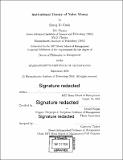Institutional theory of naive money
Author(s)
Kwak, Seung Ki
DownloadFull printable version (11.04Mb)
Other Contributors
Sloan School of Management.
Advisor
Leonid Kogan.
Terms of use
Metadata
Show full item recordAbstract
In the first chapter, I propose a theoretical framework to elucidate how capital from unsophisticated investors (naive money) is associated with fund performance dynamics. In the framework, when naive money invested in a fund exceeds the ideal amount for the manager's skill, it leads funds to under-perform persistently. In contrast, the model predicts that, when the amount of invested naive money is smaller than the ideal size of a fund reflecting the manager's skill, the fund performs the same as the market on a risk-adjusted basis. Empirical results using mutual fund data support this prediction. In the second chapter, I develop a model that characterizes how naive money influences the decisions of active mutual fund managers: in particular, managerial effort, fees, marketing expenses, private benefit-seeking, and risk-taking. My model predicts that managers who receive a surplus of naive money are inclined to reduce their managerial effort, charge higher fees, allocate more resources towards marketing, and pursue their private benefit by sacrificing returns to investors. In addition, it also predicts that a manager is most likely to increase idiosyncratic risk when the amount of invested naive money gets closer to a certain size of the fund that reflects the manager's skill. In the third chapter, I build a model to study how naive money affects funds' survivorship and entry decisions. Sufficient capital provision from unsophisticated investors elongates the survival of unskilled managers. Competition among funds determines the industry equilibrium, and the equilibrium is affected by several key market conditions: the aggregate investment opportunities, the aggregate capital inflows from unsophisticated investors, and the supply of skilled managers. When AM markets are heterogeneous in investor sophistication, the model shows, AM markets with more sophisticated investors (say, hedge fund markets) differentiate from those with less sophisticated investors (say, mutual fund markets). Skilled managers generate more value in hedge fund markets, and choose to enter those markets.
Description
Thesis: Ph. D., Massachusetts Institute of Technology, Sloan School of Management, 2018. Cataloged from PDF version of thesis. Includes bibliographical references.
Date issued
2018Department
Sloan School of ManagementPublisher
Massachusetts Institute of Technology
Keywords
Sloan School of Management.